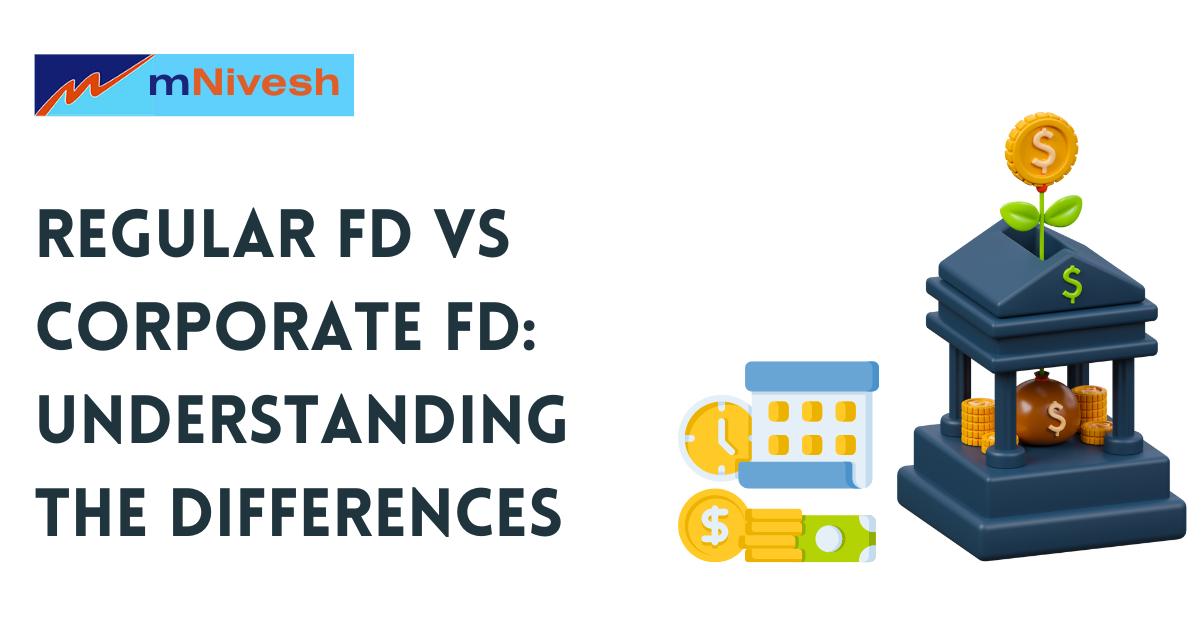Regular FD vs Corporate FD: Understanding the Differences
Regular FD vs Corporate FD: Choosing Wisely
Fixed deposits are a very popular investment option among Indian households. They offer assured returns and are not linked to market fluctuations, making them less risky compared to market-linked investments.
Traditionally, people have mostly invested in fixed deposit schemes offered by banks in India. However, fixed deposits are now being offered by corporates as well. Both types of fixed deposits have their differences, and in this article, we will have a brief overview of both and how they differ from each other.
What is a Regular Fixed Deposit?
The fixed deposits offered by banks are considered regular fixed deposits. Banks offer a variety of fixed deposits to fulfill the requirements of investors. Certain long-term FDs ranging from 5 years to 10 years offer tax benefits as well. Additionally, you can also avail of a loan against your bank FD. Regular FDs are very secure because your investment of up to ₹1 lakh is secured by Deposit Insurance. The tenure for regular FDs ranges from 7 days to 10 years.
What is Corporate Fixed Deposit?
Corporate fixed deposits are fixed deposits offered by Non-Banking Financial Companies (NBFCs) or Private Companies. They are becoming more popular among investors as they offer higher interest rates compared to bank FDs. Like regular FDs, they also offer guaranteed returns and flexibility. The tenure for corporate FDs ranges from 6 months to 5 years.
Similarities Between Regular Fixed Deposit and Corporate Fixed Deposit
Some of the similarities between corporate FDs and regular FDs are as follows:
- Both offer higher interest rates to senior citizens, generally 2-3% higher than the normal FD rate.
- Both offer guaranteed returns at a pre-determined interest rate. Even if the FD rate changes, you will still get the pre-determined return.
- You can decide the tenure as per your choice. The tenure of corporate FD can be between 6 months to 5 years, whereas the tenure of regular fixed deposits usually ranges from 7 days to about 10 years.
Difference between Regular Fixed Deposit and Corporate Fixed Deposit
| Particulars | Regular Fixed Deposit | Corporate Fixed Deposit |
|---|---|---|
| Rate of Return | The rate of return offered by bank FDs is lower than corporate FDs. | The rate of return offered by corporate FDs is higher than that offered by regular FDs. |
| Tenure | The tenure of bank fixed deposits ranges from 7 days to 10 years. This is longer compared to corporate fixed deposits. | The tenure of corporate fixed deposits ranges from 6 months to 5 years. |
| Risk Factor | Regular FDs are very secure and less risky. This is because RBI here secures your deposit with insurance up to ₹1 lakh. | Corporate fixed deposits are a bit risky as they are unsecured, and there is always a risk that the company may collapse. |
| Premature Withdrawal | If you break the fixed deposit before maturity and withdraw funds, you would be charged a penalty ranging from 1-2%. | Premature withdrawal of corporate FD is not so easy. Not all companies allow you to withdraw funds from your FD before 3-6 months from the start date of your FD. The withdrawal from corporate FDs after 6-12 months will attract a penalty of 2-3%. |
| Taxation Benefit | Bank fixed deposits offer tax benefits. There are special tax-saving FDs offered by banks, which have a lock-in period of 5-10 years. | Corporate fixed deposits do not offer tax benefits. |
Factors to Consider While Choosing Between Regular Bank FD or Corporate FD
Both regular fixed deposits and corporate fixed deposits have their benefits and drawbacks. When deciding in which to invest, consider the following factors:
- Purpose of Investment: Know the purpose of your investment to select the right FD. If you are investing for long-term goals, go for regular FDs offered by banks. If you are planning to invest for short-term goals, opt for corporate FDs as they offer high returns.
- Risk Appetite: Your risk-taking capacity also matters when making an investment decision. If you want high returns and can take risks, consider corporate deposits. They offer greater returns but are a bit riskier. On the other hand, if you are risk-averse, go for regular FDs offered by banks, as they are very secure and insured by RBI.
- Interest Rate: Compare the interest rates offered by different banks, NBFCs, and companies on fixed deposits before making a decision. Analyze them and choose the one that offers a higher interest rate.
- Review All Parameters: Don't just consider interest rates. Also, consider other parameters like tenure, lock-in period, taxation benefits, etc., before choosing between corporate FD and regular FD.
Conclusion
Both regular FDs and corporate FDs have their own benefits and risks. Analyze them thoroughly and then choose the one that is more suitable for your investment goals. If you are looking for tax benefits, opt for bank FDs. If you want to earn higher returns, consider corporate FDs. Remember, all investments carry some level of risk, so always invest wisely after careful consideration.

 Continue with Google
Continue with Google
 Continue with Yahoo
Continue with Yahoo
